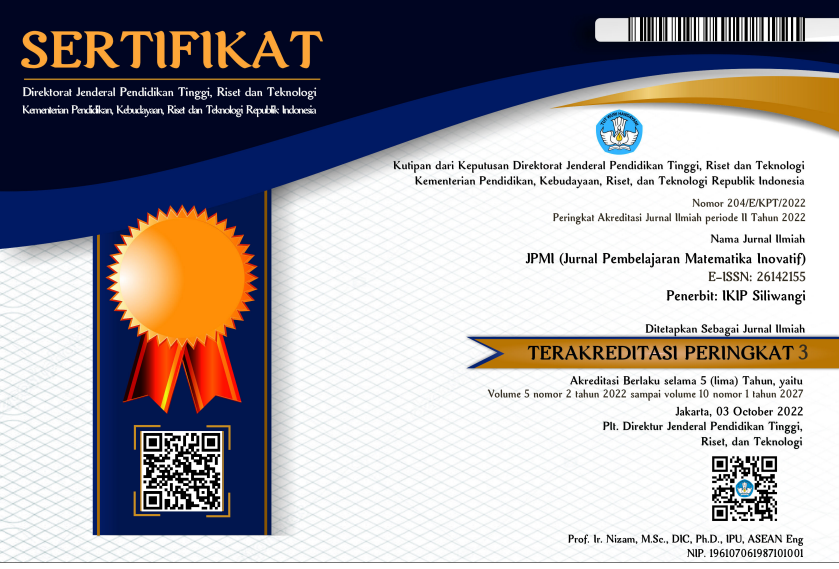PENERAPAN MODEL PROBLEM-BASED LEARNING DENGAN PEMBELAJARAN KOOPERATIF TIPE STAD UNTUK MENINGKATKAN MOTIVASI BELAJAR SISWA KELAS VII
DOI:
https://doi.org/10.22460/jpmi.v6i2.17523Keywords:
Motivation to Learn, Problem Based Learning, Model, STAD cooperative typeAbstract
This research is a classroom action research that aims to determine the motivation to learn mathematics in class VII students of SMP Negeri 1 Margaasih. This study applies the problem-Based Learning model using the STAD (Student Teams Achievement Division) Cooperative type. The Kemmis & Tanggart research model was used three cycles. The subjects of this study were student of class VII-E in group C with 10 student. The data obtained in this study through a student learning motivation questionnaire. Questionnaire data on students’ learning motivation was analyzed in the form of percentage. The results of the research were obtained for three cycles as follows: cycle 1 with a percentage of 77.2%, cycle 2 with a percentage of 85.4%, and cycle 3 with a percentage of 90%. The conclusion based on this research is that the use of the Problem Based Learning approach using the STAD (Student Teams Achievement Division) cooperative is effective in increasing the motivation to learn mathematics in class VII students at SMP Negeri 1 Margaasih.
References
Agung, A. . G. (2010). Metedologi Penelitian Pendidikan. Aditya Media Publishing.
Arief, H. S., & Sudin, A. (2016). Meningkatkan Motivasi Belajar Melalui Pendekatan Problem-Based Learning (Pbl). Meningkatkan Motivasi Belajar Melalui Pendekatan Problem-Based Learning (Pbl), 1(1), 141–150. https://doi.org/10.23819/pi.v1i1.2945
Ariyanti, W., & Sugandi, A. I. (2022). Implementasi Problem-Based Learning Berbantuan Ict Untuk Meningkatkan Kemampuan Pemahaman Matematis Siswa Smk. JPMI (Jurnal Pembelajaran Matematika Inovatif), 5(2), 579–588. https://doi.org/10.22460/jpmi.v5i2.10301
Arnidha, Y., & Noerhasmalina, N. (2018). Model Problem Based Learning (Pbl) Pada Pembelajaran Matematika. JURNAL E-DuMath, 4(2), 46. https://doi.org/10.26638/je.755.2064
Camelia, C., Maknun, L., & Pandemi, S. M. (2021). Implementasi Problem Based Learning ( PBL ) dalam Pembelajaran Jarak Jauh di MI Al-Mursyidiyyah Selama Masa. 1(1).
Eviliasani, K., Hendriana, H., & Senjayawati, E. (2018). Analisis Kemampuan Berpikir Kreatif Matematis Ditinjau Dari Kepercayaan Diri Siswa Smp Kelas Viii Di Kota Cimahi Pada Materi Bangun Datar Segi Empat. JPMI (Jurnal Pembelajaran Matematika Inovatif), 1(3), 333. https://doi.org/10.22460/jpmi.v1i3.p333-346
Irmawati, E. (2016). Pengaruh Kolaborasi Pbl Dengan Kooperatif Tipe Stad Terhadap Hasil Belajar Pada Pembelajaran Ekonomi Kelas X Sma Kartikatama Metro Lampung. Pendidikan Ekonomi, FKIP Universitas Sebelas Maret, 3(1), 1–8.
Juliasari, N., & Kusmanto, B. (2016). Hubungan Antara Manajemen Waktu Belajar, Motivasi Belajar, Dan Fasilitas Belajar Dengan Prestasi Belajar Matematika Siswa Smp Kelas Viii Se-Kecamatan Danurejan Yogyakarta. UNION: Jurnal Ilmiah Pendidikan Matematika, 4(3). https://doi.org/10.30738/.v4i3.435
Lestari, W. (2017). Pengaruh Kemampuan Awal Matematika dan Motivasi Belajar Terhadap Hasil Belajar Matematika. 3(1), 76–84.
Marlina, M., Nasrullah, A., Mahuda, I., & Junedi, B. (2020). Implementasi Problem Based Learning ( Pbl ) Untuk Mendukung Kemampuan Literasi Matematis Mahasiswa Calon Guru. Jurnal Penelitian Pembelajaran Matematika, 13(2), 209–225.
Mirza, R., Lubis, A. F., Siagian, S. F., & Simamora, S. S. (2021). Strategi Meningkatkan Motivasi Belajar Siswa Selama Pandemi Covid – 19 : Literature Review Eis. Jurnal Ilmiah Bimbingan Konseling Undiksha, 12(1), 21–30. https://doi.org/10.23887/XXXXXX-XX-0000-00
Novtiar, C., & Aripin, U. (2017). Meningkatkan Kemampuan Berpikir Kritis Matematis Dan Kepercayaan Diri Siswa Smp Melalui Pendekatan Open Ended. Jurnal PRISMA Universitas Suryakancana, VI(2), 119–131.
Nurkhin, A. (2013). Efektivitas pembelajaran tutor sebaya dalam pembelajaran Akuntansi Biaya I [The effectiveness of peer tutor learning in Cost Accounting I course]. Dinamika Pendidikan, VIII(1), 26–37. https://doi.org/10.15294/dp.v8i1.4896
Prastiti, W. (2017). Penerapan Model Pembelajaran Kooperatif Meningkatkan Aktivitas Dan Hasil Belajar Siswa Kelas Xi Ipa 1 Sman 5 Metro. 5, 62–75.
Purnama, I. L., & Afriansyah, E. A. (2016). Melalui Model Pembelajaran Kooperatif Tipe Complete Sentence Dan Team Quiz. Jurnal Pendidikan Matematika UNSRI, 10(1), 27–42.
Rahayu, E. S. (2014). Penerapan Model Pembelajaran Kooperatif Tipe Stad Untuk Meningkatkan Hasil Belajar Kelas I Sdn Ujung X Surabaya Eko Sulistyo Rahayu. Jurnal Penelitian Pendidikan Guru Sekolah Dasar, 02(02), 1–10.
Ramafrizal, Y., & Julia, T. (2018). Kajian Model Pembelajaran Kooperatif Tipe STAD (Student Teams Achievement Division) Dalam Upaya Meningkatkan Efektifitas Proses Belajar Mengajar Akuntansi. OIKOS Jurnal Kajian Pendidikan Ekonomi Dan Ilmu Ekonomi, II. https://doi.org/10.23969/oikos.v2i2.1049
Rusman. (2012). 1179-Article Text-2697-1-10-20170605.pdf.
Sururuddin, M., & Prihatini, N. (n.d.). Analisis Berbagai Faktor Penyebab Rendahnya Motivasi Belajar Siswa Kelas Iv Sdn 3 Tebaban. IV(1), 56–61.
Wahyuni, Y., & Netti, S. (2021). Analisis motivasi belajar matematika Siswa Kelas XII IPA SMA Bunda Padang A . Pendahuluan Dalam pembelajaran , motivasi sangat berfungsi mendorong siswa untuk berbuat , menentukan arah perbuatan , yakni kearah tujuan yang hendak dicapai dan menyeleksi per. 12(1), 52–59.

















